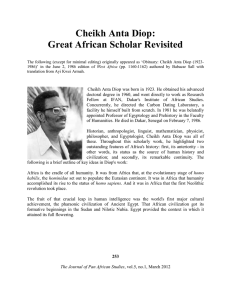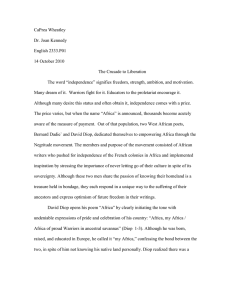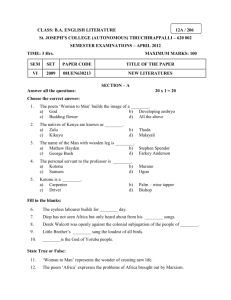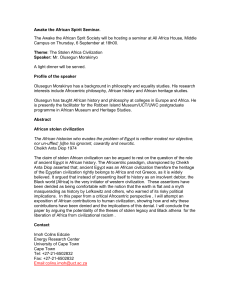CHEIKH ANTA DIOP BIOGRAPHY
advertisement
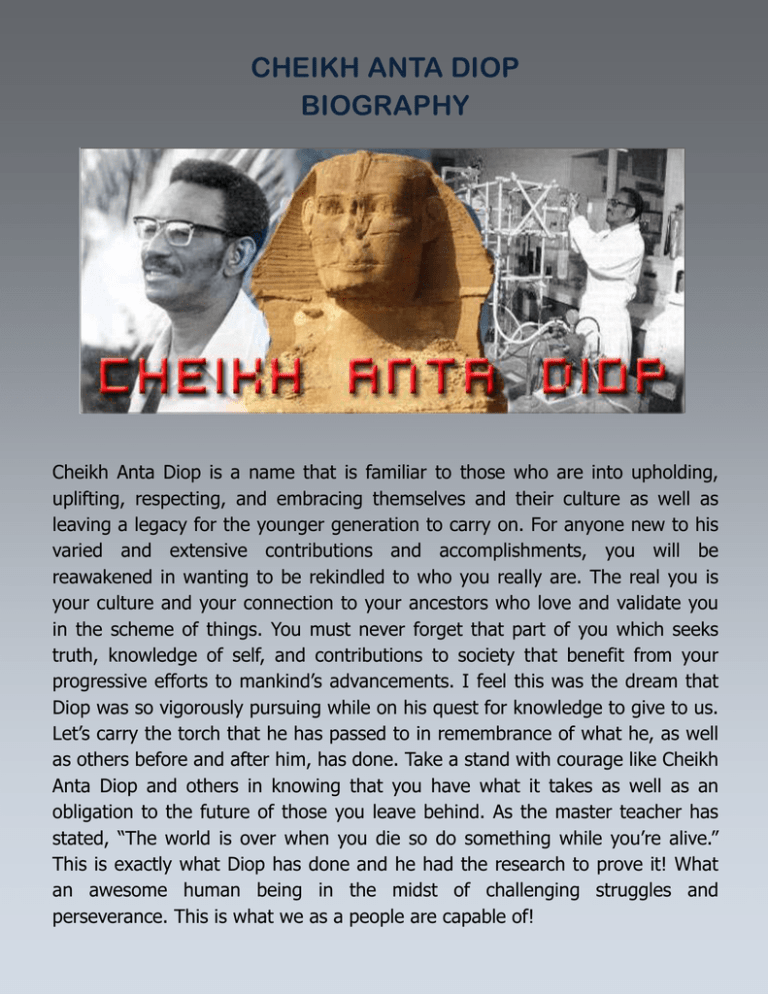
CHEIKH ANTA DIOP BIOGRAPHY Cheikh Anta Diop is a name that is familiar to those who are into upholding, uplifting, respecting, and embracing themselves and their culture as well as leaving a legacy for the younger generation to carry on. For anyone new to his varied and extensive contributions and accomplishments, you will be reawakened in wanting to be rekindled to who you really are. The real you is your culture and your connection to your ancestors who love and validate you in the scheme of things. You must never forget that part of you which seeks truth, knowledge of self, and contributions to society that benefit from your progressive efforts to mankind’s advancements. I feel this was the dream that Diop was so vigorously pursuing while on his quest for knowledge to give to us. Let’s carry the torch that he has passed to in remembrance of what he, as well as others before and after him, has done. Take a stand with courage like Cheikh Anta Diop and others in knowing that you have what it takes as well as an obligation to the future of those you leave behind. As the master teacher has stated, “The world is over when you die so do something while you’re alive.” This is exactly what Diop has done and he had the research to prove it! What an awesome human being in the midst of challenging struggles and perseverance. This is what we as a people are capable of! CHEIKH ANTA DIOP BIOGRAPHY Cheikh Anta Diop was born in Diourbel, Senegal on December 29, 1923 to an aristocratic Muslim Wolof family where he was educated in a traditional Islamic school. His family was part of the Mouride sect, the only independent Muslim group in Africa according to Diop. This was a fertile intellectual community that had produced many Muslim scholars and griots-oral tribal historians. He obtained a bachelor’s degree in Senegal before moving to Paris for graduate studies where he ended his scholastic education. When Cheikh Anta Diop was 23 years old he traveled and studied in Paris, France to continue advanced studies in Physics. He remained in Paris for 15 years studying physics and ultimately translating parts of Einstein’s theory of Relativity into his native Wolof. Diop’s education included history, Egyptology, physics, Linguistics, Anthropology, Economics, and Sociology. While studying in Paris, he “gained an understanding of the Greco-Latin world. As a student of Gaston, Bachelard, and others, Diop “acquired proficiency in such diverse disciplines as rationalism, dialectics, modern scientific techniques, prehistoric archeology and so on.” Diop was also the only Black African of his generation to have received training as an Egyptologist.” He applied this knowledge to his research on African history. After receiving his baccalaureate in Senegal, his interest in African cultural unity theories developed a deep interest in doctoral studies at the University de Paris. While there, he met with resistance concerning his initial dissertation and it was rejected because it was based on the premise that Egypt of the Pharaohs was an African civilization. Diop’s argumentative thesis stressed the great contributions of Egypt, in particular, to the origins of culture and sciences, and asserted that Egyptian civilization was of black origin, a theory that has been corroborated with anthropological evidence. However, his dissertation was published by Presence Africaine under the title nations Negres et Culture in 1955 and he won international acclaim. CHEIKH ANTA DIOP BIOGRAPHY While acquiring an education Cheikh Anta Diop became deeply interested in black studies and wanted to research them relating to the African origins of humanity and civilization. He became more active in the African student movements in the struggle against minorities and racism. Being an avid political activist led him to a pathetic struggle of ridding Africa from the claws of cultural alienation to its rightful place in history before the rise of colonialism. True to his roots, Diop believed that people who feel they possess no past of their own tend to be absorbed and assimilated into the governing system, and are made to feel inferior because of this apparent deficiency. From 1950 to 1953 he was the Secretary-General of the Rassemblement Democratique Africain (RDA) and helped to establish the first Pan-African student Congress in Paris in 1951. He also participated in the First World Congress of Black Writers and Artists held in Paris in 1956 and the second Congress in Rome in 1959. Cheikh Anta Diop returned to Senegal in 1960, to continue his research, while there, he established and became the Director of Radiocarbon Laboratory in Dakar at the Fundamental Institute of Black African (FAN) at the University of Dakar. He sat on numerous international scientific Committees and achieved recognition as one of the leading historians, linguists and anthropologists in the world. Diop has traveled widely, lectured incessantly and was cited and quoted voluminously. In 1966, the First World Black Festival of Arts and Culture held in Dakar, Senegal honored Dr. Diop and Dr. W.E.B. Dubois as the scholars who made great strides with positive Influences on African thought in the Twentieth Century. In 1974, a milestone occurred in the English speaking world when the African Origin of Civilization: Myth or Reality was published. It was also in 1974 that Diop and Theophile Obenga collectively and soundly reaffirmed the African origin of pharaonic Egyptian civilization at a UNESCO sponsored symposium in Cairo, Egypt. Diop’s last major work published was in 1981 titled Civilization or Barbarism: An Authentic Anthropology. CHEIKH ANTA DIOP BIOGRAPHY Despite his accolades and reputation internationally he was never permitted to lecture at the University of Dakar. Diop set up three successive political parties, all of which were banned, and was arrested and imprisoned several times. Diop spoke of devoting the rest of his life to a master plan that would preserve Africa for Africans but he died quietly in his sleep in Dakar, Senegal on February 7, 1986 before he could fulfill that dream. Cheikh Anta Diop received posthumously the national recognition he had been denied throughout his life: the university which had banned him from lecturing was named after him. With desperate attempts by the Colonial and Neo-colonial establishments to silence Diop’s voice and written work proved futile in the long run. His theory of the black African contribution to ancient Egyptian civilization is now widely accepted and embraced as we continue to learn more about ourselves as a means of eradicating the disease of racism. Cheikh Anta Diop was definitely a crusader in his time and a much appreciated one who fought for what he felt needed to be proven as truth as well as for the preservation of our past. It is with gratitude and respect that is given to him by empowering and enriching us as a people and the rest of the world in recognizing the beginning of civilization that started with Africa. Hira Nebt Ankh References: Cheikh Anta Diop http://www.answers.com/topic/Cheikh-anta-diop The Global African Community- Dr. Cheikh Anta & The African Origin of Egyptian Civilization By Runoko Rashidi http://www.cwo.com/~lucumi/diop.html
